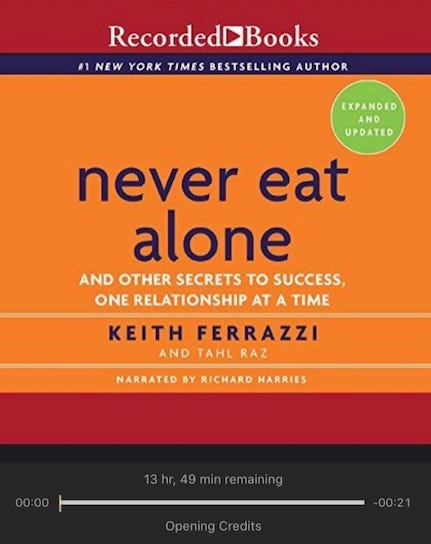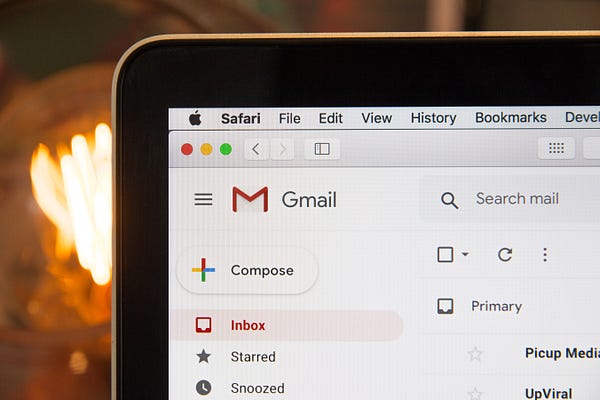Never Eat Alone by Keith Ferrazzi

At first, I thought maybe I knew most of what would be within this book; boy was I wrong. I enjoyed learning all about relationship building and what it means to truly give to others in a relationship. I expected to gain from the expertise and years of experience of the author and that is exactly what happened.
I loved this definition of success at the beginning of the book. We are called to be together. We were created to be a community in the world. By becoming one, it is not surprising to me that we experienced greater success than we ever could alone.
Science has validated: Success in life = people you meet + what you create together
I liked this and listened to it over and over and over and over to reinforce the idea. People want to give to each other. We should be kind enough to provide the opportunity.
The author said, Relationships are like muscles, the more you work them, the stronger they become. It’s the exercising of equity that builds equity.
I like this way of goal setting. It talks about the type of goals to set. Brian Tracy in his book “Get Smart” shares what I believe to be the best way to create goals. Here though, the author shares the importance of A and B goals. When people achieve their goals, many people get stuck. The greats, the most successful people teach to already have a followup goal for once you achieve the initial goal BEFORE that goal is achieved.
3 steps to goal setting:
1. Find your passion — goals are dreams with deadlines
2. Putting goals to paper
3. Create an A and B goal

I wrote previously about the book from a former FBI agent regarding body language. That book shared a best practice for observation of someone we are meeting for the first time. But here, the author shared about what we should bring to the initial meeting. It’s very important to be honest and authentic, I completely believe that, no matter what.
When meeting someone for the first time:
1. State the situation
2. Communicate your feelings
3. Deliver the bottom line
4. Use an open-ended question
I loved this idea. This makes total sense. People have difficulty finding true undivided time to work. During the regular day, they’re probably either working, in a meeting, or on the phone with someone else.
If someone’s not answering when you’re calling them directly for the first time, try to call at an unusual time, they’ll be more likely to pick up the phone.
People are so busy nowadays that I totally loved this section. The person we are trying to reach might not remember us. We should immediately reiterate who we are and why we are calling, always.
4 rules for warm calling:
1. Convey credibility by mentioning a familiar person or institution
2. State your value proposition
3. Impart urgency and convenience by being prepared to do whatever it takes whenever it takes to meet the other person on his or her own terms
4. Be prepared to offer a compromise that offers a definite followup at a minimum
The following part that I highlighted had to do with rules for an email. There were some great guidelines to follow for emails and definitely things that I will look to implement. Again, people are so busy and seemingly everyone wants to reach them by email, we must stand out and we must provide relevance as soon as possible and as concisely as possible.
- Live and die by the subject line of your email.
- If you don’t, your email may never get read. Focus on your strongest hook, either the contact you have in common or the value you have to offer.
- Send during a time they may likely already be on email.
- Be brief, your email should fit on one screen (no scrolling).
- Have a clear call to action. Make the first request clear and easy. Be exact, don’t just say you should meet, offer times. Short circuit the process as much as possible and don’t make them guess what you’re looking for.
- Read it out loud before sending it.
We meet people all the time but how many of those people do we truly remember? How many of those people remember us? We NEED to follow up quickly. We NEED to remind them who we are and why they should care about us. And finally, I agree, everyone talks a lot and says that there are a lot of different things that they will do. But, without a reminder — and something in writing — the agreed-upon thing may never come to fruition.

The author shared, Follow up within 12–24 hours after meeting someone and share something from the conversation, usually by email. Handwritten thank you notes are also excellent and be sure to let the person who connected you two know how it went. Get their commitments in writing, reiterate what was discussed and agreed upon. Always always always express gratitude.
I’ve worked with someone, Alexander Golding, who was able to do something similar for Blockchain Shift during October of 2018 in Miami, FL. It was a great experience and I know that the event would not have been as fruitful as it was without the groundwork before the conference — beyond that, I know that the primary organizer was also very very grateful for all of the support.
Call the conference organizer a few months before the event and ask if you can help out to make the event “the best yet” and you will likely gain access to private meetings and list of attendees.
Again, Alexander Golding has done this sort of thing and it was awesome to be part of it on different occasions. The saying, “It’s who you know” isn’t fully right. It doesn’t matter who you know if nobody knows you. We must be known by others — how else can we do anything of substance? We probably can’t. Hosting a dinner to open an event or during an event is a wonderful wonderful thing and something that I will most definitely be doing in the future.

Throw a dinner of your own while at an event to get together with the people you’d like to meet. Can send a fax to the hotel that most attendees may be staying at. Creating your own forum is often the best way to ensure that the people you’re looking to meet are in the same place at the same time, and many may be grateful that you have thought of them as they likely don’t have plans of their own.
The following things seem so so easy but still so often overlooked. People know this sort of thing, don’t they? I would think so. But it’s important.
“Every minute you spend in planning saves 10 minutes in execution” — Brian Tracy
I think that it is so important to become prepared and ready to interact with people. The secret to success is hard work, people say that time and time again. Beyond that, going above and beyond should be the minimum that we do in most cases. People expect us to talk to them at conferences but how many people are able to introduce people to others? How many people know the best local restaurants? Chances are, not too many, but you should.
The author shared the following: Become a center of influence. Introduce folks you meet to other people with a fact about them. Get to know some of the most important people at events by arriving early and talk to speakers before they take the stage. Become an information hub, identify information people around you may like to know. Trade data, local restaurants, etc. Actively interact with influencers who tweet that they’re attending. Share photos and info you take immediately after the event.
This next part was particularly interesting to me. I love logistics. I love understanding why things work. Tom Brady won the Super Bowl at over 40 years old, okay, but why? But how? Paul Revere is famously remembered for warning the Northeast about the British that were coming. But, how did he do that? That is what this segment of the book shared. While that was interesting, because of the focus of the book, I knew what the author was going to say. What I didn’t expect was that there was actually someone else. This gentleman went in the opposite direction of Paul Revere but he didn’t have any success. Here’s what the author wrote,
“Paul Revere knew everyone. A man named William Dawes went in the other direction. An army showed up for Revere while about 3 people showed up in the towns Dawes visited.”
Thinking back to something earlier on in the book, “Relationships are like muscles, the more you work them, the stronger they become. It’s the exercising of equity that builds equity.” With that in mind, how important is it then that we are able to share our network? Very. Here’s what Keith wrote as a point of caution when sharing networks. Or more than that, simply a few things to be aware of when we do share our networks with people.
When sharing networks with people:
1. You must be equal to trust your partners and be sure to give as much as you get.
2. You must be able to trust them because you vouch for them and their behavior with your network is a reflection of you.
3. Never give anyone full access to your contacts. Exchanging of contacts should take place around specific events, functions, or causes. Be clear with expectations and understand why they want to use your network.
I paused the audiobook after hearing the following. There was a lot of information that the author gave to us throughout the book so I wanted to connect this next point to all the things that he said. Also, I wanted to take time to think about the relationships that I have in my life and see if I could identify one of these three things for the people I’m close to.
For me, it’s changing the world that is undoubtedly my greatest motivator. I don’t need money — I believe it’s all temporary anyway. I’m not worried about finding love in my life, I know that God always loves me and will surround me with love, besides, I love myself.
Deepest motivations for people are usually one of three things — making money, finding love, or changing the world.

I read a great book by Robert Morris called The Blessed Life which goes into great detail about the following note I highlighted. Often I find myself reflecting on the parable of the 3 servants. I have written about this often also. The principle is that God will give more to those who show that they can be trusted. If we show that we can be trusted with little, God will trust us with much. We are all able to give. I find it absurd when people say things like, “someday I’ll pay it forward.” Why wait? We ALL have something to give. No matter what we have, we all have something. Who knows what holding the door for the person behind you will do for their life. The author shared some great principles that purposeful givers practice. He wrote,
Purposeful givers:
- Give to givers, focus efforts on those more likely to pay it forward.
- Feed your network first. Aware of the need to nurture their own networks and bolster social ties.
- Dedicate calendar time for giving. Consolidate giving into chunks of energy and attention.
We meet new people often, as I mentioned previously, but we don’t always remember who those people are months later. Likewise, they might not remember who we are months later either. Here are a few best practices for new relationships:
People that you’re creating a new relationship with need to see or hear your name in 3 different modes of communication before there’s substantive recognition. New relationships need to be nurtured with a phone call or email at least once per month.
“We don’t believe what we see, we believe what we already see.” — Brian Tracy
I totally agree, and Keith Ferrazzi said it a different way here:
What you see shapes how you change.
Where you look shapes what you see.
Every great relationship has trust. Every. Single. One. Here is a formula that the author included that shares how trust is created. I think that they are all important and to me, authenticity and honesty are within each and every one of those. I’d like to add a simple example of generosity then also. The Bible says, “If you, then, though you are evil, know how to give good gifts… how much more will your Father give to you those who ask Him!” — Matthew 7:10
Generosity + vulnerability + accountability + candor = trust.

People say, as the author reinforced earlier in the book, politicians are often some of the most well-connected people (just look at Donald Trump). But, I have never seen politics explained in such a marvelous way. The second part of this final highlight is so important and close to my heart. I NEVER look at a relationship with someone as having no value. Maybe there is no immediate value but that does not mean that I become just the person they need 5 years from now. Every relationship and every interaction matters.
Politics is the nexus of money, passion, and power. In politics, the unknown person you help today is the political heavy who can help you tomorrow.
I was greatly impressed by this book. This has been one of my longer reflections on the book notes and the book was not exceptionally long either. Even surrounding a topic — networking and relationship building — which I am often complimented for, I learned so so much. I love learning.

I especially love learning new ways to approach conversations and interactions with people. I recognize that everyone is unique and different and one of a kind and I think that it is so important to try to connect with everyone. While everyone might not want to connect with us and become vulnerable in conversation, we always always always have something of value to offer, we always do.
I gave this book a 4.5/5